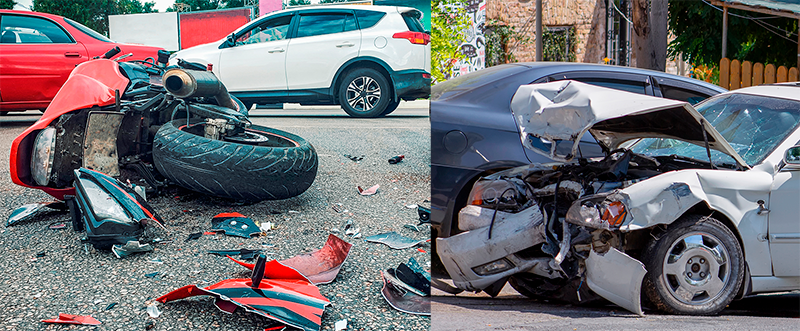
Why Are Motorcycle Accident Cases Different From Other Car Accidents?
Understanding the Differences Between Motorcycle and Car Accident Cases
Motorcycle accidents present unique challenges and risks compared to car accidents. This article explores the key differences between these two types of vehicular incidents, focusing on injury severity, accident statistics, legal implications, and insurance considerations.
1. Injury Severity
One of the most significant differences between motorcycle and car accidents is the severity of injuries sustained. Motorcyclists are far more vulnerable due to the lack of protective barriers that cars provide. Statistics indicate that approximately 80% of motorcycle accidents result in injury or death, compared to about 20% for car accidents.
Common Injuries in Motorcycle Accidents:
- Traumatic Brain Injuries (TBIs): Often a result of head impacts.
- Spinal Cord Injuries: Can lead to paralysis or long-term disability.
- Fractures: Particularly in limbs due to falls and collisions.
- Road Rash: Skin abrasions from sliding on pavement.
In contrast, car occupants benefit from safety features such as airbags and seat belts, which significantly reduce the risk of severe injuries. Car accidents typically result in injuries like whiplash and soft tissue damage, which, while serious, are often less catastrophic than those suffered by motorcyclists.
2. Accident Statistics
The statistics surrounding motorcycle accidents reveal stark differences when compared to car accidents. According to data from the National Highway Traffic Safety Administration (NHTSA), motorcyclists are nearly 24 times more likely to die in traffic crashes than occupants of passenger vehicles.
| Statistic | Motorcycle Accidents | Car Accidents |
|---|---|---|
| Fatality Rate | 22 times higher than cars | Lower due to protective features |
| Injury Rate | 80% result in injury or death | 20% result in injury or death |
| Common Injuries | TBIs, spinal injuries, fractures | Whiplash, concussions, soft tissue injuries |
This disparity underscores the need for targeted safety measures for motorcyclists, including enhanced rider education and stricter helmet laws.
3. Legal Implications
The legal landscape for motorcycle accident cases differs significantly from that of car accidents. Due to the severe nature of injuries often sustained in motorcycle crashes, these cases can involve complex legal issues:
- Liability: Establishing fault may be more complicated due to biases against motorcyclists. Jurors may hold preconceived notions about riders being reckless or irresponsible.
- Compensation: Victims of motorcycle accidents often seek higher compensation due to the severity of their injuries and long-term medical care needs.
- Insurance Challenges: Insurance companies may be less favorable toward motorcycle claims, often leading to disputes over coverage and compensation amounts.
4. Insurance Considerations
Motorcycle insurance policies differ from standard auto insurance policies in several ways:
- Coverage Types: Motorcyclists may require additional coverage options such as uninsured/underinsured motorist protection due to higher accident risks.
- Premiums: Insurance premiums for motorcycles can be higher due to the increased likelihood of severe accidents.
- Claims Process: The claims process can be more complex for motorcycle accidents because insurers may scrutinize claims more closely and potentially undervalue them based on biases against motorcyclists.
FAQ Section
Q1: Why are motorcycle accident injuries often more severe than car accident injuries?
Motorcycle riders lack the protective structures that cars provide, leading to a higher likelihood of catastrophic injuries during crashes.
Q2: What are common causes of motorcycle accidents?
Common causes include distracted driving, driving under the influence, failure to yield right-of-way, and road hazards.
Q3: How do legal processes differ between motorcycle and car accident claims?
Motorcycle accident claims can involve more severe injuries and biases against riders, complicating liability determinations and compensation negotiations.
Q4: What safety measures can motorcyclists take to reduce their risk?
Motorcyclists should wear protective gear (helmets, jackets), take rider safety courses, and adhere strictly to traffic laws.
Q5: Are there specific insurance requirements for motorcycles?
Yes, motorcycle insurance typically requires different coverage types compared to standard auto insurance, including liability coverage and potentially additional protections.
Conclusion
Understanding the differences between motorcycle and car accident cases is crucial for riders and drivers alike. The unique risks associated with motorcycles necessitate specific safety measures, legal considerations, and insurance policies tailored to protect motorcyclists on the road. As awareness grows regarding these differences, efforts can be made to improve safety for all road users.For further reading on motorcycle safety statistics and regulations, you can refer to this Wikipedia page.
